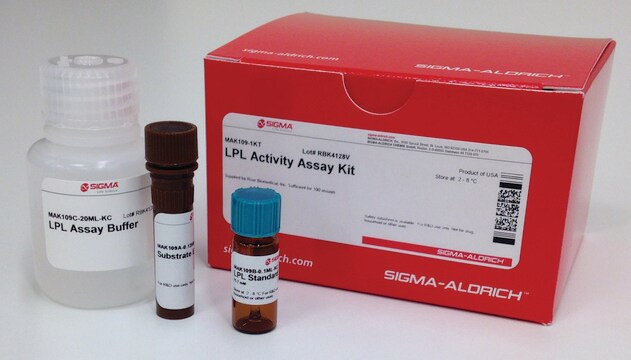MAK277
GAPDH Activity Assay Kit
sufficient for 100 colorimetric tests
Sinónimos:
Glyceraldehyde-3-phosphate Dehydrogenase Activity Assay Kit
Iniciar sesiónpara Ver la Fijación de precios por contrato y de la organización
About This Item
UNSPSC Code:
12161503
NACRES:
NA.84
Productos recomendados
detection method
colorimetric
relevant disease(s)
cancer
storage temp.
−20°C
General description
GAPDH (Glyceraldehyde-3-Phosphate Dehydrogenase; EC 1.2.1.12) catalyzes the conversion of Glyceraldehyde-3-Phosphate (GAP) to 1, 3-Bisphosphate Glycerate (BPG) and plays a key role in glycolysis. The enzyme is involved in cellular processes such as apoptosis, membrane trafficking, iron metabolism and nuclear translocation. GAPDH (housekeeping gene) expression is stable and constitutive. Deregulation of GAPDH activity is associated with abnormal cell proliferation and carcinogenesis. Accurate quantitation of GAPDH activity is important for diagnosing diseases and studying normal cellular physiology.
Application
GAPDH Activity Assay Kit has been used to measure the enzyme activity of glyceraldehyde-3-phosphate dehydrogenase in testis.
Features and Benefits
Compatible with high-throughput handling systems.
Suitability
Suitable for use with various tissue and cell culture samples.
Principle
The GAPDH Activity Assay Kit provides a simple and sensitive method for monitoring GAPDH activity in various samples. GAPDH activity is determined in a coupled enzyme reaction in which GAP is converted to BPG by GAPDH. This results in a colorimetric (450 nm) product proportional to the enzymatic activity present. The assay is sensitive to 100 mUnits/mL. One unit of GAPDH activity is the amount of enzyme that will generate 1.0 mmole of NADH per minute at pH 7.2 at 37 °C.
signalword
Danger
hcodes
Hazard Classifications
Aquatic Chronic 3 - Eye Dam. 1 - Skin Corr. 1B
Storage Class
8A - Combustible corrosive hazardous materials
Certificados de análisis (COA)
Busque Certificados de análisis (COA) introduciendo el número de lote del producto. Los números de lote se encuentran en la etiqueta del producto después de las palabras «Lot» o «Batch»
¿Ya tiene este producto?
Encuentre la documentación para los productos que ha comprado recientemente en la Biblioteca de documentos.
Los clientes también vieron
Altered expression profile of glycolytic enzymes during testicular ischemia reperfusion injury is associated with the p53/TIGAR pathway: effect of fructose 1, 6-diphosphate.
May A L and Renno W M
PeerJ, 4, e2195-e2195 (2016)
Samir El Qaidi et al.
Scientific reports, 11(1), 3834-3834 (2021-02-17)
Type III secretion system effector proteins have primarily been characterized for their interactions with host cell proteins and their ability to disrupt host signaling pathways. We are testing the hypothesis that some effectors are active within the bacterium, where they
May Al-Maghrebi et al.
PeerJ, 4, e2195-e2195 (2016-07-22)
Background. Testicular ischemia reperfusion injury (tIRI) is considered the mechanism underlying the pathology of testicular torsion and detorsion. Left untreated, tIRI can induce testis dysfunction, damage to spermatogenesis and possible infertility. In this study, we aimed to assess the activities
Nuestro equipo de científicos tiene experiencia en todas las áreas de investigación: Ciencias de la vida, Ciencia de los materiales, Síntesis química, Cromatografía, Analítica y muchas otras.
Póngase en contacto con el Servicio técnico


